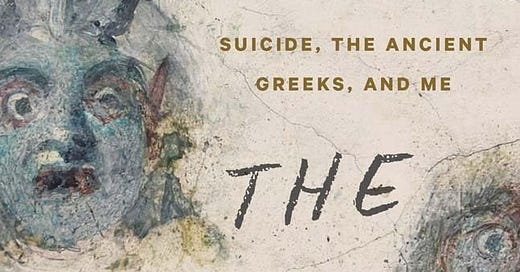Book Review: Facing Down the Furies by Edith Hall
A review of a succinct exploration of a taboo topic, viewed both through the eyes of an academic and a victim of its wrath
Months ago, I mentioned in my review of Trauma Plot by Jamie Hood that I had expected the book to lean into classical themes as it had been marketed to me, and that I hoped for some other author to actualize this idea in my mind. Edith Hall’s Facing Down the Furies does just that. Specifically, Hall looks at the relationship her ancestors have had with suicide and applies the themes of certain works from the ancient world to the last 3 generations of her family. It is easy to liken a shared tragedy of this nature to a curse, just as the house of Atreus suffered in the Greek world, but there are other reasons one may take their own life. By exploring different factors of the lives of people who took their own life in both the last century and the classical era, the reader gains a fuller understanding of the topic at hand. Naturally, if readers are sensitive to such topics, this review ought to be avoided.
The first link that Hall brings up is the genetic one. According to her research, there are alleles out there that show up in enough people who express suicidal ideation that some scientists feel comfortable linking a predisposition to them. This is not only a boring answer to the situation that has plagued Hall’s bloodline, but it is incomplete. A world of difference exists between ideation and execution. Why, then, have so many of her ancestors taken their own lives? The author attaches each significant tragedy to a story from antiquity that mirrors their lived experience in one way or another. Her mother, for example, was said to have refused food towards the end of her life in the same vein as the Roman practice of inedia (or, simply, not eating) that Caracalla’s mother, among others, chose to undertake rather than face a loss of social status. Readers grow to see that the “simple” topic of suicide has many different facets that can drive one to dark places; some selfish, others altruistic; some violent, others calm; some socially pressured, others a machination of one’s own psyche. Even though we like to think about how far our age has come in talking about mental health, it begins to feel inappropriate to some degree to push all suicides under the same umbrella.
It’s a difficult thing to express one’s views on suicide from a first- or second-person perspective given the social taboos that surround it. There are very few people out there who believe that suicide benefits people or their communities, and even fewer who would express such a notion publicly, so most of the literature out there spends pages upon pages proselytizing against it in case someone suicidal is looking for a reason. Hall instead comes to the table with no such bias against it, but ultimately coming to the same conclusion, which is an important distinction. As someone who struggles with the same sort of issues as she describes, I find that more objective and honest sort of perspective to be refreshing. I’ve read a handful of academic works in the same vein as this book that address some of the similarities between suicides in the ancient world, but Hall’s pathos adds significantly to the reader’s reception. Weaving her personal experiences in between the historical perspectives keeps things fresh. There were some areas that Hall changed my perspective on and others I still disagree with, but that’s usually a good indicator that an academic has exhaustively laid out the background behind the topic at hand.
With the repeated caveat that people who are sensitive to the topic of suicide ought to read other things, I wholeheartedly recommend this book. It’s difficult to write a good memoir and gauge what family stories and internal “lore” other people will care about, but by slapping a thesis on the back of it and juicing it up with details about the ancient world it becomes a more focused work. I give this three stars, and I plan on working back through Hall’s bibliography in the coming months.




